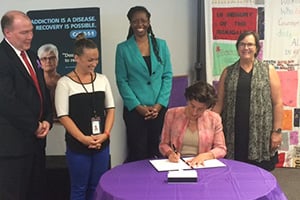Posted: Tuesday, August 04, 2015 Governor Gina Raimondo signed an executive order today at Anchor Recovery Community Center in Pawtucket to establish a task force to address the epidemic of opioid overdoses in Rhode Island.
Governor Gina Raimondo signed an executive order today at Anchor Recovery Community Center in Pawtucket to establish a task force to address the epidemic of opioid overdoses in Rhode Island.
State officials, treatment providers, members of the recovery community and law enforcement officers joined Governor Raimondo at the signing held at Anchor, the state’s first recovery community operated by The Providence Center. The Overdose Prevention and Intervention Task Force task force seeks to address the leading cause of accidental deaths and the rising numbers of deaths from drug overdoses. Last year, Rhode Island recorded 239 deaths caused by drug overdose.
The Governor noted the work of treatment providers and the recovery community in building the foundation for the task force’s work. “Because of the good work that you have done, we are starting in Rhode Island from a point of strength,” Governor Raimondo said.
Among the initiatives currently in place to address opioid overdose is The Providence Center’s AnchorED program. AnchorED connects individuals who have presented at the emergency room with an opioid overdose with recovery services. Prior to being released, a peer recovery coach from Anchor Recovery Community Center meets with the patient to introduce them to recovery supports and resources that will help keep them on the road to recovery. Recovery coaches play an important role in helping individuals avoid another overdose and encouraging them to stay engaged in treatment. Recovery coaches are on call on weekends at Kent, Memorial, Rhode Island, Miriam, Newport, Hasbro and Landmark hospitals.
Recovery Coach Roxxane Newman spoke of her own recovery journey and the need for improving the approach to treating addiction. As an overdose survivor, Newman knows how critical accessible, effective treatment programs are in saving lives. After her overdose in 2012, no one was there to direct her to treatment options.
"I can’t tell you how critical that moment is when you wake up and have another chance,” she said. “We don’t know the day that someone will want to get into treatment, but we can prepare, first, by helping people survive, and by providing programs to maintain recovery.”
The task force will begin its work this month to develop goals, metrics and objectives to reduce the number of overdose deaths. Associate Director of Anchor Recovery Community Centers Thomas Joyce was appointed to the task force.
Copyright © 2024 Care New England Health System